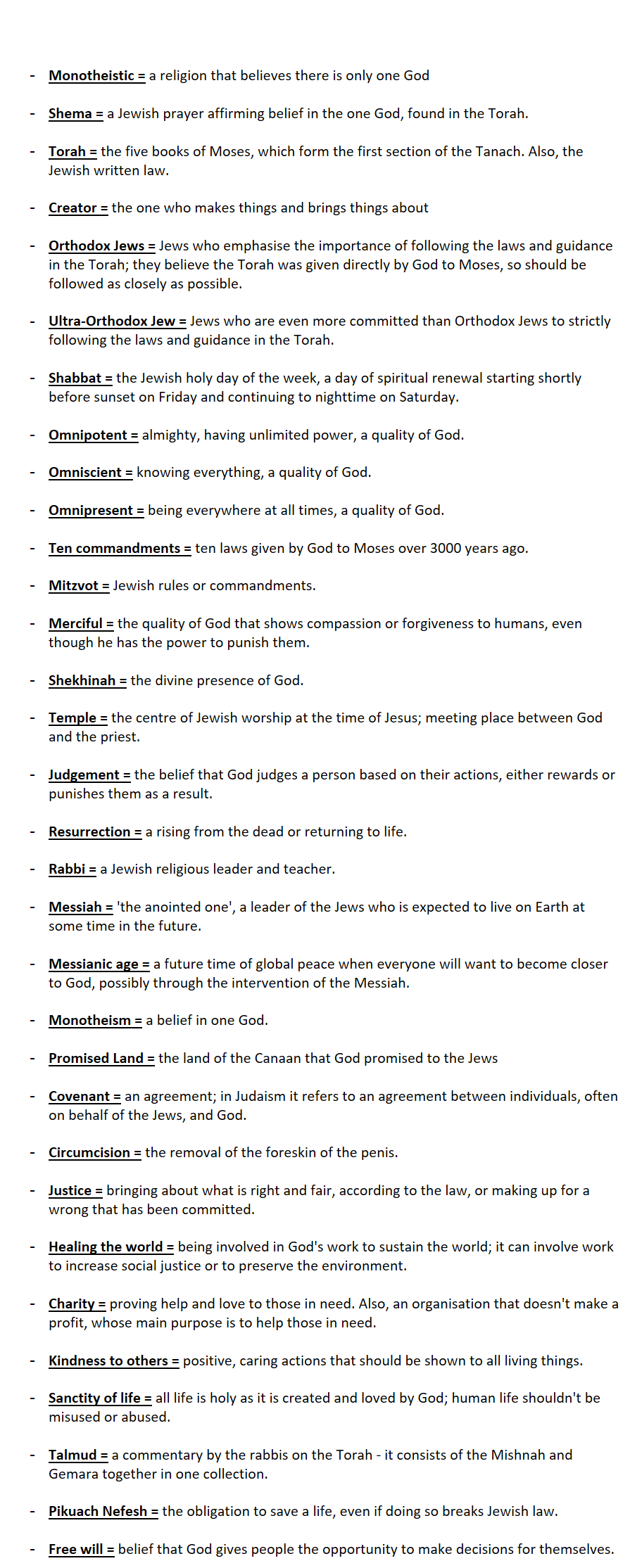Judaism key terms
Monotheistic = a religion that believes there is only one God
Shema = a Jewish prayer affirming belief in the one God, found in the Torah.
Torah = the five books of Moses, which form the first section of the Tanach. Also, the Jewish written law.
Creator = the one who makes things and brings things about
Orthodox Jews = Jews who emphasise the importance of following the laws and guidance in the Torah; they believe the Torah was given directly by God to Moses, so should be followed as closely as possible.
Ultra-Orthodox Jew = Jews who are even more committed than Orthodox Jews to strictly following the laws and guidance in the Torah.
Shabbat = the Jewish holy day of the week, a day of spiritual renewal starting shortly before sunset on Friday and continuing to night time on Saturday.
Omnipotent = almighty, having unlimited power, a quality of God.
Omniscient = knowing everything, a quality of God.
Omnipresent = being everywhere at all times, a quality of God.
Ten commandments = ten laws given by God to Moses over 3000 years ago.
Mitzvot = Jewish rules or commandments.
Merciful = the quality of God that shows compassion or forgiveness to humans, even though he has the power to punish them.
Shekhinah = the divine presence of God.
Temple = the centre of Jewish worship at the time of Jesus; meeting place between God and the priest.
Judgement = the belief that God judges a person based on their actions, either rewards or punishes them as a result.
Resurrection = a rising from the dead or returning to life.
Rabbi = a Jewish religious leader and teacher.
Messiah = 'the anointed one', a leader of the Jews who is expected to live on Earth at some time in the future.
Messianic age = a future time of global peace when everyone will want to become closer to God, possibly through the intervention of the Messiah.
Monotheism = a belief in one God.
Promised Land = the land of the Canaan that God promised to the Jews
Covenant = an agreement; in Judaism it refers to an agreement between individuals, often on behalf of the Jews, and God.
Circumcision = the removal of the foreskin of the penis.
Justice = bringing about what is right and fair, according to the law, or making up for a wrong that has been committed.
Healing the world = being involved in God's work to sustain the world; it can involve work to increase social justice or to preserve the environment.
Charity = proving help and love to those in need. Also, an organisation that doesn't make a profit, whose main purpose is to help those in need.
Kindness to others = positive, caring actions that should be shown to all living things.
Sanctity of life = all life is holy as it is created and loved by God; human life shouldn't be misused or abused.
Talmud = a commentary by the rabbis on the Torah - it consists of the Mishnah and Gemara together in one collection.
Pikuach Nefesh = the obligation to save a life, even if doing so breaks Jewish law.
Free will = belief that God gives people the opportunity to make decisions for themselves.
